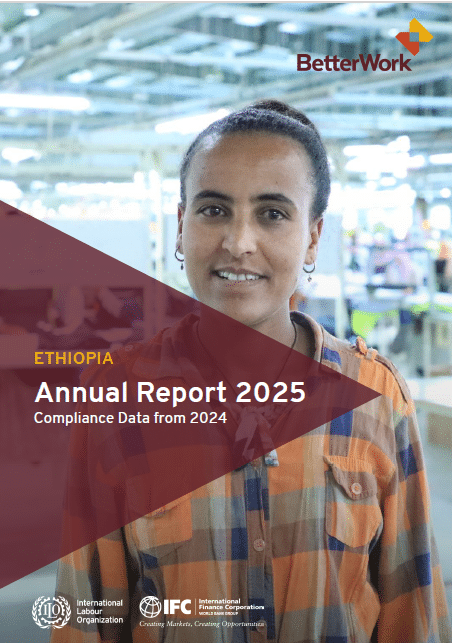Based on compliance data from 2024, this report highlights the key activities and impacts of Better Work Ethiopia (BWE).
Since 2019, Better Work Ethiopia has been part of a comprehensive and coordinated ILO programme to promote decent work and inclusive industrialization in Ethiopia. The programme, ‘Advancing Decent Work and Inclusive Industrialization in Ethiopia,’ or ‘ONEILO-SIRAYE’, operates at national, regional, and factory levels, involving different ILO departments and key global programmes, namely Sustaining Competitive and Responsible Enterprises (SCORE), Vision Zero Fund (VZF), Labour Administration, Labour Inspection, and Occupational Safety and Health Branch (LABADMIN/OSH), and Inclusive Labour Markets, Labour Relations and Working Conditions Branch (INWORK), to address the key challenges to advancing decent work in the country as one programme.
Ethiopia’s textile and garment sector has been a cornerstone of its industrial ambitions, reflecting both its rich history and future potential. The industry encompasses the entire value chain from cotton cultivation to garment manufacturing. Notably, while the country has about 3 million hectares suitable for cotton production, only a small fraction is currently utilized, indicating significant room for expansion.
Ethiopia’s security situation in 2024 has shown signs of relative improvement following the peace agreement in November 2022, which ended the Tigray conflict. However, challenges persist due to sporadic unrest in Oromia, Amhara, and other regions, along with lingering tensions caused by ethnic and political divisions. These dynamics have continued to affect the garment and textile sector with varying intensity. Factories in stable regions, such as the Hawassa Industrial Park, have resumed operations and maintained some level of production. However, security concerns in other areas have disrupted supply chains and raised costs. Investors remain cautious as perceptions of instability impact decisions about expanding operations or committing to long-term investments.
Ethiopia continues to face the repercussions of losing access to the U.S. African Growth and Opportunity Act (AGOA), which provided duty-free access to U.S. markets for approximately 6,500 products. Ethiopia’s AGOA eligibility was suspended on January 1, 2022, due to concerns over human rights violations. Despite ongoing discussions and efforts to address these issues, the U.S. government announced on December 21, 2024, that Ethiopia will remain ineligible for AGOA benefits in 2025, marking the third consecutive year of exclusion.
Despite these challenges, Ethiopia is advancing its economic reform programme, launched in 2024 to address structural problems and promote sustainable growth. Key reforms include liberalizing the foreign exchange market, strengthening the financial sector, and mobilizing domestic revenue. While these measures are expected to boost long-term economic stability, their benefits have yet to reach the apparel sector, which remains vulnerable to global trade dynamics, internal conflict and access to international markets.
Additionally, the documentary “Made in Ethiopia” released in November 2024, provides a nuanced exploration of China’s industrial influence in Africa through the experiences of individuals involved in Ethiopia’s apparel sector. The film highlights the complexities of globalization, power imbalances, and cultural conflicts within the industry.
